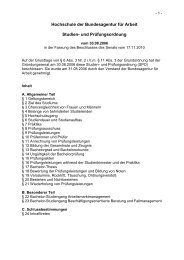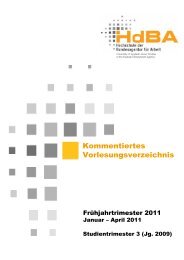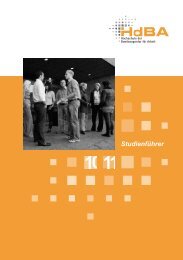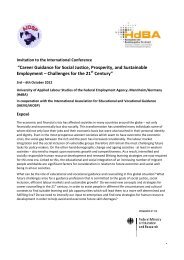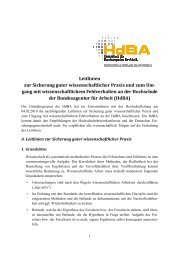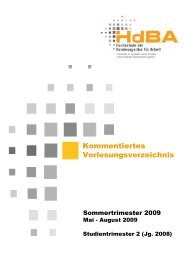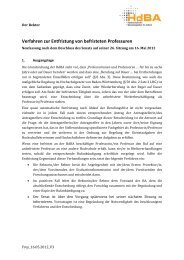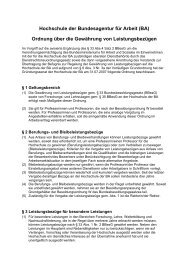Brain Drain - Hochschule der Bundesagentur für Arbeit
Brain Drain - Hochschule der Bundesagentur für Arbeit
Brain Drain - Hochschule der Bundesagentur für Arbeit
Create successful ePaper yourself
Turn your PDF publications into a flip-book with our unique Google optimized e-Paper software.
�����������������������������������������<br />
���������������������������������������������������������������������<br />
�<br />
�<br />
1.4 Unit 3: Psychodynamic Approaches (Bordin)<br />
• The psychodynamic theory documented in the works by Anne Roe and Robert<br />
Hoppock.<br />
• Vocational interests develop as a result of interaction between adults and<br />
children.<br />
• Occupational needs which are reflections of the desire to satisfy the needs not<br />
satisfied by parents during childhood.<br />
• Psychodynamic point of view on the years of early childhood wielding decisive<br />
effect on the entire life of an individual.<br />
• The period of early childhood as a source of unconscious motivation influencing<br />
choice of an occupation that would allow expressing and satisfying of the needs.<br />
• Three types of parents / child relationship: emotional orientation on a child,<br />
avoiding contact with a child, acceptance of a child.<br />
1.5 Unit 4: Learning Theories/Social Cognitive Career Theory<br />
(Krumboltz)<br />
• Theories of development of the occupational career based on the cognitive model<br />
and on the model of social science.<br />
• The effect of the interrelated biological maturation and social environment<br />
(including the mother, the father and the closest family circles) on the child’s<br />
mental development and the course of development of the occupational life<br />
(Tiedman, Erikson).<br />
• The eight phases of development, the eight crises on the solution of which traits of<br />
the child’s future personality depend.<br />
• The phases: infancy, early childhood, the age of play and the early school age.<br />
• The special meaning of the phase of adolescence.<br />
• The phases: maturity and old age.<br />
• The seven-phase model of making occupational decisions: research,<br />
crystallization, choice, explanation, induction, change and integration.<br />
• The emphasis on the cognitive reorganisation of an individual „from the inside to<br />
the outside” as Tiedeman’s special contribution to the theory of the occupational<br />
career.<br />
• The Krumboltz approach – there are four factors influencing the occupational<br />
decisions: the genetic predisposition, conditions and events in the surrounding<br />
environment, experience acquired in the process of education and the ability to<br />
approach tasks (e.g. the system of values, work habits).<br />
• The effect of internal and external processes.<br />
• The influence of an individual on events which he or she consi<strong>der</strong>s to be<br />
supporting.<br />
107






